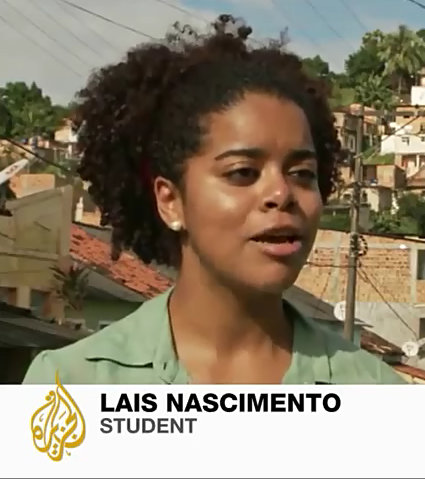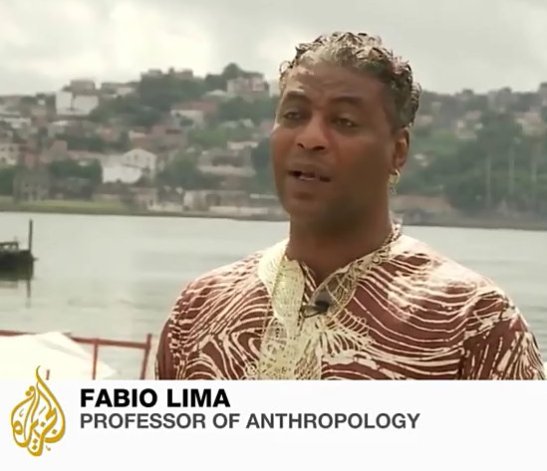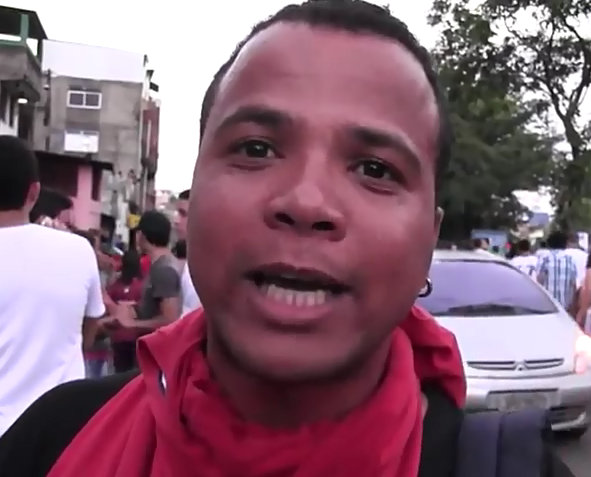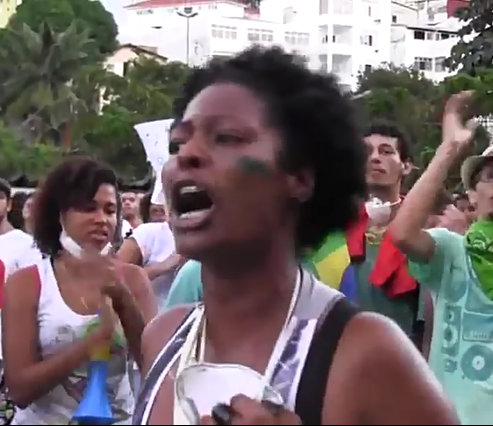Black protesters in 76% Afro-Brazilian state of Bahia take their demands to the streets

The historic protests that happened all over Brazil in the last few weeks made headlines all over the world being compared to the Occupy Wall Street Movement, the Arab Spring and the French student protests of 1968. But some wondered, where are the black people? In a country in which a little more than half claim African ancestry (around 100 million of 200 million citizens), it seemed that the faces at the protests were overwhelmingly white.

The northeastern region of the country is known for having the largest percentage of African descendants of any region of the country, with three states claiming black populations of about 76%. The state of Bahia and its capital city, Salvador, are known for its vibrant African culture as well as its population. The videos below offer another perspective of the protests, why some Afro-Brazilians are in the streets, what they want and why many decided to stay home.

Many of the of the comments and signs take issue with the fact that Brazil’s government is spending billions of dollars in anticipation of the country hosting the 2014 World Cup and 2016 Olympics. According to the latest figures, Brazil is spending R$7 billion reais (worth about US$3.3 billion dollars) on the construction or refurbishing of new and existing stadiums alone. Estimated costs of overall World Cup projects are already over R$30 billion reais (about US$14.2 billion) and could increase while hugesocial inequalities continue to exist in areas such as health care and education.

These inequalities are overwhelmingly burdensome on the Afro-Brazilian population which just two months ago recognized the 125th anniversary of the end of slavery in Brazil in May of 1888. The video report by Al Jazeera sets the total number of African slaves sent to Brazil during the Trans-Atlantic Slave Trade at 10 million but it is generally recognized that between 4-5 million of a total of 10-12 million Africans were sent to Brazil, representing about 38-40% of all slaves (in comparison to the 460,000 or 4.5% sent to the United States).
In the videos, you will hear a few mentions of “outskirts” or “periferia (periphery)” which are often used interchangeably with terms like “favela” or “subúrbio”, referring to areas of poverty that are found throughout Brazil with populations that are majority Afro-Brazilian. For on these terms and their meanings, see our analysis of the 2012 TV mini-series Subúrbia. The first video courtesy of Al Jazeera is fully reported and dubbed in English. For the second video, courtesy of our friends over at Mídia Étnica, the key comments are translated by Lorelei Williams below the video.
Brazilians of African descent demand equality
Protests in Salvador, Bahia – June 20, 2013
Comments starting 0:52 mark: “This is the second day of protests. The second day of uprising in Salvador da Bahia. The Movimento Negro (black movement) is here. The movement of Black youth is in the street. We are here to say that we have a role in the development of our country! The main issue is the question of public transport – of urban mobility. For us, poor people, Black people, who live in the “periferia” (poor areas) we don’t have quality transportation. And we have a right to move in the city freely…. This is an issue that the country needs to stop and address. Now! Or we will not make room for FIFA – for the World Cup. We won’t stop this movement. We won’t lose. Not for fundamentalism, homophobia, racism. We won’t stop for the armed forces that are here threatening us! Our people have been here for a long time. Since the days of Zumbi and Dandara (1) (Afro-Brazilian freedom fighters/quilombo leaders). We’ve been fighting since the revolution of the Malês. We’ve been in movement. We are fighting for our survival. We demand full citizenship – and we’ll keep fighting! United people. Black people. We are in this together.
Key comments of woman at the 2:23 mark of the video: “People – be conscious of your rights! ….We don’t want or need two Carnivals. We want quality education, healthcare, better streets!.”
Notes
1. Dandara was a black woman warrior of Brazil’s colonial period. She was the wife of Zumbi of Palmares (the greatest black leader of Brazil’s runaway slave societies known as quilombos) also the mother of his three children. Dandara killed herself when she was arrested on February 6th, 1694, in order to not return to slavery. Although there is not much data about the life of Dandara, the stories are legendary. Today, many black women’s organizations and cultural group take their names in memory of Dandara.
